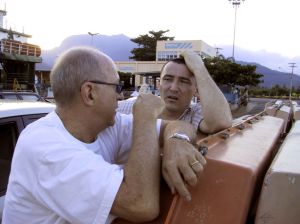Wondering how to speak Portuguese?
It may be easier than you may have thought!

Olá, tudo bem?
Do you want to know how to speak Portuguese and how other people speak Portuguese? This page will give you the answer. So please, read on!
Every time you want to learn and speak a new language I believe you may wonder where to start.
Knowing how to speak Portuguese may not be an exception.
We all know that in order to know speak Portuguese we need to do a few things first, such as:
1. Understanding that there are different categories of words that play different roles in a sentence - 1st really important fact to get you to know how to speak Portuguese.
2. Learning some Portuguese vocabulary.
3. Learning how to use some Portuguese Verbs and Tenses - Vital to know how to speak Portuguese.
4. Learning how to build a sentence following a good Portuguese word order.
OK, four things so far to master to get to know how to speak Portuguese.
I would also dare to say that, in order for you to know how to speak Portuguese, you need to know how to tell stories too!!!
In fact, every time we speak with others we tell them stories, don't we?
We tell them what happened, what is happening or what is going to happen, and so on... This is knowing how to speak Portuguese!
Indeed, we tell others what somebody said to somebody else, how somebody reacted about something, or what could have happened under a certain condition, etc, etc, etc... (Once again, this is knowing how to speak Portuguese!)
Each sentence we utter is a tiny part of a story.
These parts are no more than small sentences placed one after another in a logical way. The whole lot forms our story. Eeeeasy!
knowing how to speak Portuguese is knowing how to tell stories!
There are however, at least, two ways you can recount or tell a story to other people.
You can use direct speech or reported speech.
OK, let me explain.
When we use either direct speech we are telling the story using the same words that somebody used when something happened, for instance, in a dialogue between two people.
Example:
"Ele perguntou: Vamos ao cimema?" - "He asked: Are we going to the cinema?"
"Eu respondi: Hoje não porque trabalho até muito tarde." - "I replied: Not today, because I work until very late."
But we can report the same conversation using reported speech, in other words, not using the exact words of the original conversation.
Example:
"Ele perguntou se nós íamos ao cinema." - "He asked if we were going to the cinema."
"Eu respondi que não porque trabalhava até muito tarde" - "I replied no because I was going to work until very late."
You see, we are saying the same thing but in two different ways.
And this is a basic and simple way we use to communicate with others.
If you think about this accept it and use it, you know how to speak Portuguese.
Moreover, quite often in a conversation, we interchange these two ways of speech, which makes our story even more interesting, simply because it's less monotonous than if we were using the same structure over and over again.
OK. But you may be thinking "how do I do that?"
I can tell you that in order for you to "tell a story" to somebody else, you need to know a few rules - this is part of knowing how to speak Portuguese...
These rules will give you the key to make you confident about how to speak Portuguese correctly.
And this key requires you to distinguish these two types of speech - "direct and reported speech".
The following table will tell you what to do. Check it out one by one carefully. I also included the English translation for each example for you to understand it better.
How to speak Portuguese
| (The exact words someone used to tell a story) If the original sentence is in the: |
(The way you tell a story) Then, you change it to the: |
| Eu abro a porta. I open the door |
Ele disse que ele abria a porta. He said that he opened the door. |
| (Indicative or Subjunctive) Eu abro a porta.(Indic.) I open the door. Oxalá eu passe no exame.(Subj) God willing I pass the exam. |
(Indicative or Subjunctive) Ele disse que ele abria a porta. (Indic.) He said that he opened the door. Ele disse que oxalá ele passasse no exame. (Subj) He wished he passed the exam. |
| Ontem você abriu a porta? Yesterday did you open the door? |
Ele perguntou-me se ontem eu tinha aberto a porta. He asked me if yesterday I had opened the door. |
| Por favor, comam a sopa. Please (guys) eat the soup. |
Personal Infinitive A mãe deles disse que comessem a sopa. (Imp.Subj.) Their mother told them to eat the soup. A mãe deles disse para eles comerem a sopa. (Pers.Inf.) Their mother told them to eat the soup. |
| A farmácia fica aqui. The chemist's is here. |
Ele disse que a farmácia ficava lá. He said that the chemist's was there. |
These are basically the rules.
But I know, you may be thinking about how this may apply in real life conversations, and how you can apply these rules in order to know how to speak Portuguese.
In order for you to understand what I'm talking about here, I'm going to present here an excellent example done by Juliet (an excellent student of mine who makes me proud for being her teacher) who's also passionate about Portuguese, and who has an incredible talent for writing and telling amazing stories.
We all thank you Juliet!
Indeed, she knows by now how to speak Portuguese well!
So, please read the column on the right first, then the column on the left.
Then compare and contrast paragraph by paragraph, and see the changes that have been made from Direct Speech to Reported Speech.
At the end, I'm sure you'll realise that knowing how to speak Portuguese is not that difficult.
So here you go. The story is called "A Cidade Contra O Campo" - "The City Versus The Countryside"
| |
|
| Há uma semana atrás, dois amigos encontram-se por acaso num café perto da estação de Waterloo em Londres.
Eles conhecem-se há muito tempo mas não se vêem desde 2000 pois o Carlos vive há alguns anos numa aldeia no norte da Inglaterra enquanto o Pedro vive no centro de Londres. Felizmente, eles reconhecem-se e começam a conversar. Pedro: Boa tarde, Carlos. Que surpresa! O que fazes em Londres? Carlos: Eu assisto a um congresso. Pedro: E eu estou à espera da minha esposa. Vamos ao teatro hoje à noite. Há uma óptima escolha de entretenimento aqui na cidade. Tu ainda gostas da vida no campo? Corre tudo bem? Carlos: Claro que gosto! É tão bonito, e tranquilo também. Mas a vida na cidade deve ser insuportável. Pedro: De maneira nenhuma. Tem muitas vantagens. Por exemplo, tenho um bom emprego com um bom salário e boas oportunidades de promoção. Carlos: Como todos sabemos, as pessoas que vivem numa grande cidade como Londres precisam de muito dinheiro já que o custo de vida é maior do que no resto do país. Apesar de eu ganhar menos dinheiro, consegui comprar uma linda casa com um jardim enorme onde cultivo legumes e frutas. Pedro: Que bom! No entanto, nós podemos obter produtos agrícolas frescos no mercado que se realiza perto da nossa casa todos os sábados. Há também uma grande variedade de restaurantes em Londres onde podemos provar a comida de todas as nacionalidades. Jantamos fora frequentemente com os amigos. A vida social aqui é fantástica e conhecemos pessoas de todos os cantos do mundo. Na minha opinião a sociedade no campo é mais limitada. Carlos: Em parte é verdade, mas acho que nós conhecemos os nossos vizinhos muito bem; todos são amáveis e portanto há um forte sentido de comunidade na nossa aldeia. Pedro: Admito que isso é uma vantagem de viver num lugar pequeno. Mas acredito que, às vezes, a vida lá pode ser chata. Há uma grande falta de cultura, por exemplo. Uma grande cidade tem tanto para oferecer: galerias de arte, museus, teatros, cinemas, concertos, lugares de interesse histórico. Ontem visitei a nova exposição das obras de Van Gogh na Academia Real das Artes. Carlos: Mesmo que não tenhamos todas essas atrações, existem na aldeia vários grupos, para música, drama e jardinagem, e há um teatro, bem como um cinema, na vila mais perto. E não há nada melhor do que caminhar na bonita paisagem, respirando o ar fresco. A poluição, o barulho do trânsito e as multidões na cidade são muito desagradáveis. Pedro: Talvez tenhas razão. Apesar de termos os espaços verdes, como o Hyde Parque, sâo sempre movimentados. Mas o que achas dos serviços de saúde na tua área? Não nos podemos esquecer que numa grande cidade temos óptimo acesso aos hospitais bem equipados e aos melhores especialistas. Carlos: É verdade que os hospital mais perto fica a vinte quilômetros da nossa casa. Mas por outro lado há na aldeia um bom médico que conhece pessoalmente todos os seus clientes. Em todo o caso, a vida no campo é mais saudável. Pedro: Concordo até certo ponto, mas a vida na cidade é mais estimulante. Carlos: Não te preocupas com o nível de criminalidade? Pedro: Só um pouco. Em geral nós sentimo-nos seguros: na minha opinião a esmagadora maioria das pessoas é obediente à lei e eu tenho confiança na polícia. Carlos: Então, a vida na cidade é muito divertida e tem muitas vantagens tanto para a carreira como para o lazer? Pedro: Acho que sim ... mas obviamente no campo é possível ter um ritmo de vida mais calmo. Carlos: É verdade ... mas tu estás a convencer-me de que as oportunidades na cidade são maiores do que elas no campo. Talvez precise dum novo desafio. Há uma casa que se venda perto de ti? Pedro: Que coincidência! Eu começo a pensar em sair de Londres para uma vida mais sossegada no campo. Seria bom viver mais perto da natureza. Vamos trocar? |
Na semana anterior dois amigos encontraram-se por acaso num café perto da estação de Waterloo em Londres.
Eles tinham-se conhecido há muito tempo mas não se tinham visto desde 2000 pois o Carlos vivia há alguns anos numa aldeia no norte da Inglaterra enquanto o Pedro vivia no centro de Londres. O Pedro perguntou ao Carlos porque ele estava em Londres e o Carlos respondeu que assistia a um congresso. O Carlos respondeu que tudo era muito agradável e que, na sua opinião, a vida na cidade era insuportável. O Pedro não concordou, e disse que viver numa grande cidade tinha muitas vantagens. Por exemplo, tinha conseguido um bom emprego com um bom salário e boas oportunidades para promoção. O Carlos disse que, como todos sabiam, as pessoas que viviam numa grande cidade como Londres precisavam de muito dinheiro já que o custo de vida na cidade era maior do que o no resto do país Ele contou que, apesar de ganhar menos dinheiro, tinha comprado uma linda casa com um jardim enorme onde cultivava legumes e frutas. O Pedro concordou que aquilo era bom, mas explicou que ele e a sua esposa obtinham produtos agrícolas frescos no mercado que se realizava perto da casa deles todos os sábados. Havia também uma grande variedade de restaurantes em Londres onde podiam provar a comida de todas as nacionalidades, disse ele. O Pedro acrescentou que a vida social era fantástica e que conhecia pessoas de todos os cantos do mundo. Ele pensou que a sociedade no campo era mais limitada. O Carlos respondeu que aquilo era verdade em parte, mais pensou que ele conhecia os seus vizinhos muito bem, e que portanto havia um forte sentido de comunidade na sua aldeia. O Pedro admitiu que aquilo era uma vantagem de viver num lugar pequeno. Mas acreditou que a vida ali podia ser chata por causa duma grande falta de cultura. Ele deu ênfase às coisas que uma grande cidade tinha para oferecer: galerias de arte, museus, teatros, cinemas, concertos, lugares de interesse histórico. Por exemplo, no dia anterior tinha visitado a nova exposição das obras de Van Gogh na Academia Real das Artes. O Carlos argumentou que, mesmo que a aldeia não tivesse todas essas atrações, existiam vários grupos, de música, drama e jardinagem, e que havia um teatro, bem como um cinema, na vila mais perto. E não havia nada melhor do que caminhar na bonita paisagem, respirando o ar fresco. Segundo o Carlos, a poluição, o barulho do trânsito e as multidões na cidade eram muito desagradáveis. O Pedro achou que o Carlos talvez tivesse razão. A cidade tinha alguns espaços verdes, como o Hyde Parque, mas frequentemente estavam movimentados. No entanto, outra vantagem da cidade era o ótimo acesso aos hospitais bem equipados e aos melhores especialistas. Ele perguntou ao Carlos o que achava dos serviços de saúde na sua área. O Carlos admitiu que o hospital mais perto ficava a vinte quilómetros da sua casa. Mas por outro lado havia um bom médico na aldeia que conhecia pessoalmente todos os seus clientes. Em todo o caso, a vida no campo era mais saudável. O Pedro concordou até certo ponto, mas insistiu que a vida na cidade era mais estimulante. O Carlos depois quis saber se o Pedro se preocupava com o nível de criminalidade. O Carlos deduziu que a vida na cidade era muito divertida e que tinha muitas vantagens tanto para a carreira como para o lazer. O Carlos disse que o Pedro o tinha convencido de que as oportunidades na cidade eram maiores do que as do campo. Talvez precisasse dum novo desafio. Ele perguntou ao Pedro se havia uma casa que se vendesse perto dele. O Pedro respondeu que aquilo era uma grande coincidência! Ele começava a pensar em sair de Londres para viver uma vida mais sossegada e mais perto da natureza, no campo. O Pedro sugeriu uma troca e os amigos decidiram falar mais sobre aquela possibilidade na semana seguinte.
|
You see, how amazing this is?
If you follow these rules it's not difficult to know how to speak Portuguese. Is it?
Obviously, you need to know the Portuguese Verb Tenses and Modes, but you can always buy a book with all the verbs conjugated to help you, like this book below.

Knowing how to tell stories is indeed the secret to knowing how to speak Portuguese, and by knowing how to speak Portuguese you can communicate with any Portuguese native speaker!
And I think that's it for today. These are the rules.
Well, I hope you have enjoyed this page as much as I did building it. I just realised it took me about three hours to do so... I know, building tables is time consuming, but I guess you got a better understanding about how to speak Portuguese well. :-)
And, in any case, I know you'll appreciate it!
Um abraço.
Rafa x
PS: if you have any other queries about how to speak Portuguese, please be in touch.
The link I'm presenting to you on this page is an affiliate link, which means that your purchase will count as a contribution to help me keep this site running. Muito obrigado! :-)





